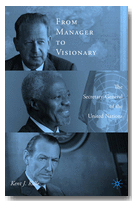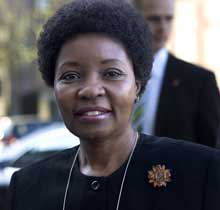 Kent J. Kille’s new work From Manager to Visionary: The Secretary-General of the United Nations
Kent J. Kille’s new work From Manager to Visionary: The Secretary-General of the United Nations is an insightful look at character and leadership among the seven past Secretaries-General of the United Nations. His study fills a critical gap in the existing literature by addressing the impact of each office holder’s leadership style apart from the international politics of their day.
In introducing the goal behind his study, Kille suggests a division that marks previous works on the Secretaries General. Many scholars overlook the specific character of the individual office holders, the vast majority suggesting the political conditions overwhelmed any significant differences. Others suffer from what Kille describes as the “super Secretary-General syndrome,” praising all seven past Secretaries-General equally. Though calls for a study of leadership styles appear in the literature, none offer the type of analysis which Kille provides. Kille’s quantitative analysis offers a predictive framework within which an office holder is likely to respond to the constraints placed on them by the Charter, member states or events. At the same time, he offers his assessment without making the subject overly academic or inaccessible to the layman.
Drawing on leadership metrics developed by Margaret Hermann, Kille codes for six personal characteristics (responsivity, belief in personal influence, need for relationships, need for recognition, supranationalism and problem-solving emphasis) revealed by Secretaries-General in their remarks at unscripted press conferences. He weighs these against three proposed leadership styles – managerial, strategic and visionary. In Kille’s view, managers will be “constraint respecters,” strategists will be “constraint accommodators,” and visionary Secretaries-General will tend to be “constraint challengers.”
The UN Secretary-General operates through numerous avenues to manage or influence the work of the organization. Broadly speaking, these include shaping the organization’s agenda through his strategic political position and by making political statements, involvement in the peaceful settlement of disputes, and in the administration of UN peacekeeping missions. For comparative study, Kille reviews in detailed case studies the ways in which the higher scoring Secretaries-General within each leadership style used these opportunities for influence. In Kille’s assessment, Kurt Waldheim represents the more managerial Secretary-General, Dag Hammarskjöld the more visionary, and Kofi Annan the more “strategic” in their respective approaches.
The case studies show a significant if not perfect match between Kille’s predictive framework and Hammarskjöld, Waldheim and Annan’s actual behavior while in office. The slight deviations suggest some necessary refinements to the leadership metrics and styles which Kille initially proposed. Nonetheless, even when the observed behavior occurred did not match entirely with the Kille’s predicted behavior, the officeholders never shifted far from their predicted preferred style. Given that Kille only provides for three leadership styles and given the human nature of the seven office holders, this would not be unexpected. But Kille’s proposed continuum, from manager to visionary, holds true very well. Managerial Waldheim may have occasionally acted, according to Kille, as a strategist, but never as a visionary. Likewise, Hammarskjöld never acted as a manager in facing contraints to his leadership. Though he does not provide case studies for them, Kille suggests that Trygve Lie, Javier Perez de Cuellar and Boutros Boutros-Ghali would likewise never deviate far from their respective predicted styles. (U Thant is an exception that Kille acknowledges and describes in further detail.)
No one leadership style, Kille concludes, should be preferred for the post of Secretary Generalship. A rotation of managers, strategists and visionaries would maintain member states’ confidence in the United Nations as an organization and in turn allow it to evolve in the governance of international relations.
Further research could refine the leadership styles Kille has proposed and more accurately explain the approach each Secretary-General took to the office in relation to the events of his day. At a minimal, Kille and others should attempt to refine the metrics in ways that describe Secretaries-General’s style so as to address Thant’s “outlier” characteristics, perhaps by proposing additional leadership styles that allow for more refined predictions. More revealing would be studies that successfully relate the styles of individual Secretaries-General within the political environments in which they find themselves. Such might employ counterhistoricals to the extent possible, if only as an intellectual indulgence. How might the managerial Thant have addressed the U.S. action in Iraq? How would Annan have responded to Khruschev’s shoe-banging? Would Boutros-Ghali have been as visionary during the 1973 oil embargo?
From Manager to Visionary is a new seminal work in the literature and clearly earns Kille a place in the company of Erskine Childers, Sir Brian Urquhart and Edward Luck as an authority on the Secretaries-General. His contribution will influence how other scholars describe the impact of past Secretaries-General and, for many of us today, will undoubtedly be a key resource that we turn to in assessing the words and actions of Secretary Ban Ki-moon over the next decade.

 Secretary General
Secretary General 



